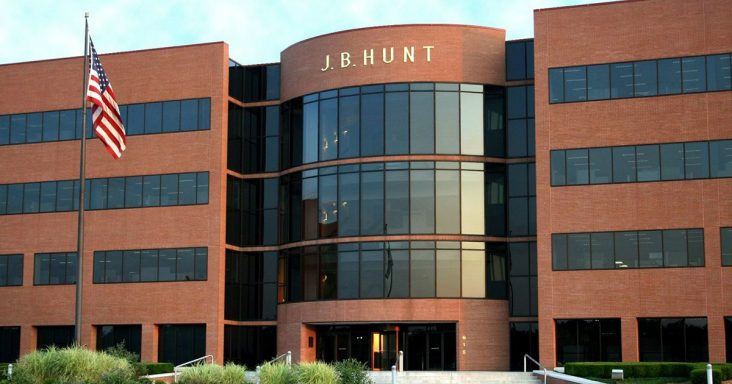J.B. Hunt CEO earns nearly 3% raise in 2021; company announces carbon cut effort
by April 4, 2022 12:01 pm 2,192 views

John Roberts III, president and CEO of Lowell-based carrier J.B. Hunt Transport Services Inc., received a 2.7% salary increase and total compensation of $8.8 million in 2021, according to the company’s proxy statement.
The company’s recently released proxy statement shows executive compensation and items shareholders will vote on during the annual stockholders meeting at 10 a.m., April 28 at the company’s headquarters at 615 J.B. Hunt Corporate Drive in Lowell. Also, on Monday (April 4), the carrier announced a new program to help customers reduce their carbon footprint in their supply chain.
According to the proxy statement, Roberts’ base salary was $937,115 in 2021, up from $912,115 in 2020. Total compensation rose by 18.1% in 2021, from $7.45 million in 2020. John Kuhlow, chief financial officer and executive vice president, received a 73.1% base salary increase in 2021. Kuhlow, who was named to his existing role in 2020, earned $400,000 in 2021, up from $231,123 in 2020. Kuhlow’s total compensation rose by 102% to $2.77 million in 2021, from $1.37 million in 2020.
Shelley Simpson, chief commercial officer and executive vice president of people and human resources, received a 10.8% base salary increase in 2021. Simpson’s salary increased to $600,000 in 2021, from $541,500 in 2020. Her total compensation rose by 9.5% to $3.67 million in 2021, from $3.35 million in 2020.
Nicholas Hobbs, chief operating officer, president of contract services and executive vice president, received a 10.8% base salary increase in 2021. Hobbs’ salary increased to $600,000 in 2021, from $541,500 in 2020. His total compensation rose by 9.6% to $3.66 million in 2021, from $3.34 million in 2020.
Darren Field, president of intermodal and executive vice president, received a 14.7% salary increase in 2021. Field, who was named to his existing role in 2020, earned $444,231 in 2021, up from $387,308 in 2020. His total compensation rose by 28.5% to $3.25 million in 2021, from $2.53 million in 2020.
During the April 28 shareholders meeting, company stockholders of record as of March 8 will vote on the election of directors, an advisory vote on executive pay and whether to appoint PricewaterhouseCoopers LLP to serve as the company’s independent registered public accounting firm for 2022. Following are the directors seeking reelection for a one-year term: Douglas Duncan, Francesca Edwardson, Wayne Garrison, Sharilyn Gasaway, Gary George, Thad Hill, Bryan Hunt, Gale King, Roberts, James Robo and chairman Kirk Thompson.
Following are the company’s shareholders that own more than 5% of its stock: Johnelle Hunt of Rogers owns 17.4%, The Vanguard Group of Malvern, Pa., owns 9.2%, T. Rowe Price Associates Inc. of Baltimore owns 7.8%, and BlackRock Inc. of New York owns 5.6%.
CARBON FOOTPRINT PROGRAM
According to a Monday news release, J.B. Hunt has launched a program allowing customers to acquire carbon offset credits equivalent to the emissions created by their shipments. The CLEAN Transport program is available for the carrier’s intermodal customers and will expand to additional service areas as part of the program’s growth, according to the release.
“J.B. Hunt is committed to leading the industry toward a low-carbon future,” said Craig Harper, chief sustainability officer and executive vice president of J.B. Hunt. “Many of our customers are working toward short- and long-term sustainability goals, and CLEAN Transport will serve as a great extension of the efforts they’re already taking to reduce the carbon footprint of their supply chain.”
The program will help customers offset carbon emissions based on transportation route each quarter, the release notes. J.B. Hunt will work with third-party organizations and provide participants with data showing the amount of carbon offsets needed to achieve a carbon-neutral shipment and earn carbon credits supporting the project the customer selects. Carbon offset projects include reforestation, forest management, regenerative agriculture and clean power generation.
Customers can choose which transportation routes are part of the program or J.B. Hunt can provide recommendations based on a carbon footprint evaluation. The carbon offset projects available through the program are verified and registered with organizations such as the American Carbon Registry, Verra, Gold Standard and Climate Action Reserve to confirm that emission reduction and removal were successful and the intended environmental benefits were achieved, according to the release.
J.B. Hunt avoided nearly 4.3 million empty miles in 2020 by using its technology platform J.B. Hunt 360 to secure backhaul freight, the release shows. The company also noted that converting an over-the-road shipment to intermodal reduces the shipment’s carbon footprint by an average of 60%. Recently, the company also announced it would expand its intermodal fleet up to 150,000 containers in the next three to five years as part of a joint initiative with BNSF Railway Co.
Shares of J.B. Hunt (NASDAQ: JBHT) were trading Monday at $176.84, down $4.67 or 2.57%. In the past 52 weeks, the stock has ranged between $155.11 and $218.18.
